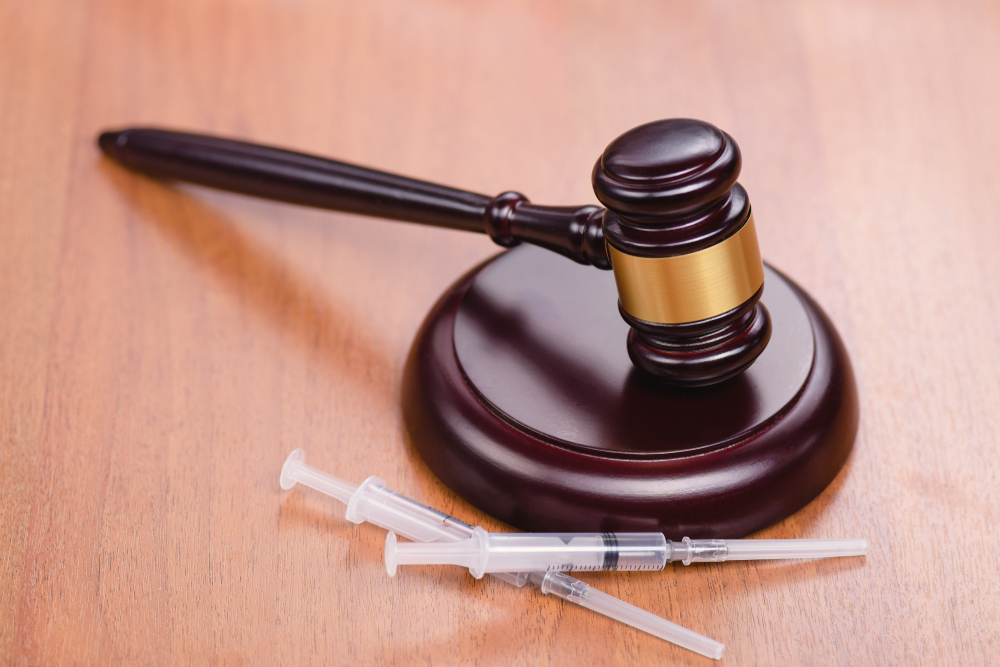As one of the nation’s agricultural centers, Illinois is among the leading states in the use of a controversial weedkiller, glyphosate, which is better known by the brand name “Roundup.” This product is at the center of a legal firestorm surrounding its safety and possible connection to a rare form of cancer.
More than 100,000 lawsuits have been filed against Bayer, the company that makes Roundup, and its subsidiary Monsanto, which invented the product. So far, three juries have all found that the weedkiller causes cancer and that Monsanto misled the public about the potential dangers.
Juries have awarded plaintiffs, all in California, more than $2 billion in damages, though in all cases, the amounts were lowered on appeal. Still, none of Bayer’s appeals have succeeded in overturning the results of these cases. Perhaps seeing the writing on the wall, Bayer has offered a proposed settlement that could top $10 billion.
While it is primarily used in agriculture, Roundup is also used by homeowners, groundskeepers, landscapers, and others to control vegetation. This has helped make it the most widely used herbicide in history. What should people in Illinois know about this product, their risk for serious illness, and what rights they may have to seek compensation if they were harmed by using Roundup?
What Does Roundup Do?
The active ingredient in Roundup is a chemical called glyphosate. Before Monsanto patented it as an herbicide in 1970, glyphosate had long been used in the maintenance of large, commercial water systems to reduce buildup of scale and calcium.
Glyphosate is a non-selective herbicide, which means it kills any plant it comes into contact with. It is believed that the nature of how glyphosate attacks plants is what makes it so effective, as the chemical prevents plants from creating one of the enzymes necessary for normal growth. Because this enzyme does not exist in humans or mammals, Monsanto has maintained that the product therefore cannot harm humans, but juries and others have disagreed — more on this later.
Since 1974, more than 3.5 billion pounds have been applied on farm fields, yards, and other areas in the United States, according to one study. In Illinois, the figures for glyphosate use in agriculture are simply staggering. According to data from the U.S. Geological Survey, only Iowa has seen more glyphosate used for farming.
Glyphosate Usage in Illinois
- Since 1992, almost 335 million pounds of glyphosate have been used in Illinois farming.
- Illinois ranks No. 2 in the nation for glyphosate use, barely behind Iowa (434 million pounds).
- Corn and soybeans combined account for about 99% of all glyphosate used in Illinois.
- About 600 billion bushels of soybeans and 2.1 billion bushels of corn were produced in Illinois in 2020 —the first and second largest harvests in the country, respectively.
Is Roundup Dangerous?
Though recent years have seen Roundup usage fall as concern has risen about its safety, in 2017 alone, more than 20 million pounds of glyphosate were used on Illinois farm fields. In addition to eye-popping jury awards, many studies have linked glyphosate to a rare form of cancer.
Roundup remains legal for use in the United States, but many cities, towns, and counties across the country have banned it. Glyphosate use is also not permitted in many parts of Europe. Among places that have restricted or outright banned the use of Roundup are Mexico, Thailand, Vietnam, and Luxembourg.
Here in Illinois, the chemical was at the heart of a campaign by residents of Naperville who wanted to make permanent a temporary ban on using Roundup to control vegetation in city parks, and other bans are in place in many localities across the U.S.
Roundup and Non-Hodgkin Lymphoma (NHL)
Non-Hodgkin lymphoma (NHL), a rare form of cancer, is at the heart of health-related fears over Roundup. Every plaintiff in the three cases that so far have ended up in jury verdicts against Bayer and Monsanto has been diagnosed with this type of cancer.
NHL accounts for about 4% of all U.S. cancer cases. Symptoms of NHL include:
- Weight loss
- Chills
- Swollen lymph nodes
- Swollen abdomen
- Fatigue
- Chest pain
- Shortness of breath
- Cough
- Frequent, severe infections
- Unexplained swelling
- Easy bruising
- Fever
- Night sweats
According to American Cancer Society estimates, almost 82,000 people will be newly diagnosed with NHL this year alone, and about 21,000 people will lose their lives to it. It’s more common in women than in men, and population-adjusted rates of non-Hodgkin lymphoma have climbed by about 5% over the past few decades.
Survival rates for NHL are relatively high if the disease is discovered early in its progression, and it has a five-year survival rate of 73% in early stages. If it’s not found until after it is spread throughout the body, the five-year survival rate is only 57%.
A 2019 study by researchers at the University of Washington found that glyphosate exposure raises a person’s risk of developing non-Hodgkin lymphoma by more than 40%, and since 2015, the International Agency for Cancer Risk has listed glyphosate as a probable carcinogen.
In 2020 the U.S. Environmental Protection Agency (EPA), the organization responsible for assessing the dangers of a variety of substances, reaffirmed its position that glyphosate is unlikely to cause cancer. However, that position has not been the agency’s consistent view from the start. In 1985, an EPA panel indicated that there was evidence to suggest that glyphosate causes cancer and formally listed it as a Class C carcinogen. That determination was reversed, and since 1991, glyphosate has been approved by the EPA for use.
If you show any of the above symptoms and believe that you may have developed NHL as a result of exposure to Roundup, you should immediately seek medical treatment.
What Is the Current Status of Roundup Litigation?
As mentioned earlier, the three trials that have gone before juries in which the plaintiffs alleged that using Roundup gave them cancer have each ended in jury verdicts favoring the plaintiffs. With about 100,000 other cases pending in which other plaintiffs are making identical allegations, Bayer in 2020 extended an offer to settle the majority of cases for a combined $10 billion. Negotiations over that settlement continue, and many plaintiff advocates believe the total amount is far too low.
The first case to proceed to trial against Bayer, Monsanto, and Roundup was that of Dewayne “Lee” Johnson, a former school groundskeeper, and the jury in that case gave Johnson a stunning $289 million verdict, later reduced on appeal. Two other cases followed, including a $2 billion award for a couple who both were diagnosed with non-Hodgkin lymphoma after using Roundup for years. That award also was slashed upon appeal.
However, no appeals so far have been successful in overturning any aspect of the jury verdicts except for the financial awards. In addition to continuing negotiations over Bayer’s proposed $10 billion settlement, the company has suggested it would set aside $2 billion to settle future cases over Roundup. Neither settlement has been approved yet.
Bayer and Monsanto so far haven’t recalled or reformulated Roundup, and they continue to appeal the three verdicts they lost even as they make settlement offers. Notably, in addition to juries in the three cases that have been decided so far agreeing that Roundup causes cancer, each has also determined that Monsanto (and by extension Bayer) knew the dangers of Roundup and glyphosate, but concealed those risks from the public.
Labelling Settlement
In a matter separate from the cancer-related cases, Bayer is facing lawsuits over the product’s label, which many people suggest is misleading due to language stating that Roundup is safe because the mechanism by which it kills plants is impossible in humans, pets, and other animals. Bayer has agreed to settle class-action cases over its product label for $40 million, and Illinois residents who qualify can receive a maximum of about $90 in that settlement. The eligibility period in Illinois runs from Feb. 13, 2015, to the present day.
How Much Can I Get From a Roundup Lawsuit in Illinois?
All three trials so far that have proceeded to jury verdicts against Bayer were in California, but people in Illinois still should consider those cases instructive if they used Roundup and later were diagnosed with cancer.
That is because not only have those cases helped contribute to putting pressure on Bayer to settle the more than 100,000 cases pending, including many in Illinois, but future cases are also possible against Bayer and Monsanto.
When it comes to the preliminary $10 billion settlement the company offered in June 2020, damages would be based on a points system that would mean some people would receive more than others. The average would be about $165,000 per plaintiff, far below the jury verdicts that have been awarded thus far.
Several other stipulations were attached to the preliminary settlement offer, including:
- Must be diagnosed with non-Hodgkin lymphoma.
- Must have used Roundup at least a year before diagnosis.
- Must be a U.S. citizen.
- Points based on age at diagnosis and injury severity.
- Most points awarded to families of people who died.
- Points increased for those diagnosed with primary central nervous system NHL —a more severe type.
- Points deducted for families of those who died before 2009, or if they had no spouse or minor children.
What Should I Do if I Have Been Affected by Roundup?
If you used Roundup, whether for your job or to control weeds around your property, and were later diagnosed with non-Hodgkin lymphoma, your best bet is to consult with an expert class-action law firm in Illinois. We can help connect you to the relevant legal experts.
Many firms in Illinois have experience specific to Roundup and other environmental contamination cases, thanks in part to the state’s position as an agricultural leader in the U.S.
In most Illinois Roundup cases, you will only pay legal fees if you win your case, and you may be eligible for a free initial consultation to help you determine your next steps.





